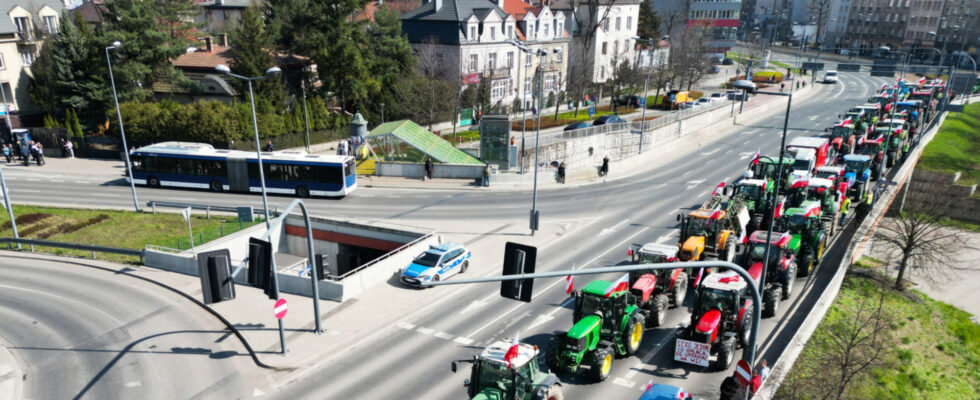Polish farmers again installed hundreds of blockades across their country on Wednesday, opposing imports of agricultural products from third countries and environmental measures from the European Union. Since last month, farmers have blocked the flow of goods at border crossings with Ukraine to protest against what they consider unfair competition with the arrival of foodstuffs from the war-torn country.
70,000 demonstrators expected
“More than 580 demonstrations are planned today across Poland, in which almost 70,000 people are expected to participate,” according to a police statement. Farmers are notably blocking access roads to Warsaw and other large cities, including Krakow, Wroclaw, Poznan and Bydgoszcz. “We will not give up until our demands are fully met,” assured organizers in a press release.
A major blockade was installed at the gates of Warsaw, in Zakret, closing the eastern access to the capital. “We are essentially fighting for the abolition of the Green Deal. It is the priority. And we want the border closed (with Ukraine),” Slawomir Miesak, 57, a farmer with 32 farms, told AFP. hectares, participating in this gathering. According to Tomasz Broda, a farmer in his forties, “when you look at the prices of beef and pork in stores and supermarkets and compare them to what the farmer receives, It’s pennies, it’s ridiculous.”
Buses blocked at the Ukrainian border
On Wednesday, protesters also blocked the movement of passenger buses via the Polish-Ukrainian border crossing at Medyka. “The farmers have blocked passenger traffic in Medyka, they only let one bus pass every two hours,” Joanna Golisz, spokesperson for the local police, told AFP. According to Roman Kondrow, the organizer of the protest in Medyka, this is a “spontaneous” approach.
“A lot of people have joined our rally and it is a spontaneous reaction. I am opposed to it but there are a lot of emotions among people,” he told AFP. Roman Kondrow co-signed “preliminary commitments” with the Polish Ministry of Agriculture on Wednesday which, however, were unable to retain the already advanced organization of the blockades.
“It’s a little glimmer of hope that something will finally happen,” said Roman Kondrow. The big problems that persist “are what we call ‘technical wheat’ which should no longer pass through the border but which continues to pass beyond any control (…) and the surplus of wheat stocks, between four and five million tonnes, which must be evacuated from Poland,” he underlined.
On the German border
Blockages also continued on Wednesday at the border with Germany, in Poland but also in the neighboring Czech Republic. Around a hundred tractors blocked the German-Czech border crossing at Strazny for an hour. The Czech Agricultural Chamber said it expected 1,600 tractors and other vehicles to take part in protest rallies across the country.
Ukraine saw its agricultural sector and main export routes through the Black Sea crippled by the Russian invasion in 2022. In order to help Kiev economically, Brussels removed customs duties on goods in 2022 Ukrainians transiting through the EU. However, due to logistical problems and fraud, a large part of Ukrainian exports destined for third countries remained in Poland, to the detriment of local producers.
Discussions in the European Parliament
During the night from Tuesday to Wednesday, EU countries and the European Parliament agreed to cap certain Ukrainian agricultural imports exempt from customs duties – eggs, poultry, sugar, but also oats, corn and honey -, responding to a reason for anger in the sector. However, they did not include wheat and barley. Border blockades and disputes over grain have strained relations between Warsaw and kyiv, even though Poland has shown unwavering support for its neighbor since the Russian invasion.
The demonstrations by Polish farmers are part of a large movement of demonstrations by their colleagues from several other European countries. The European Union has presented proposals aimed at reforming certain rules of the Common Agricultural Policy (CAP), in order to appease the continent’s farmers. The proposed changes to the CAP still need to be negotiated between member states and the European Parliament.
